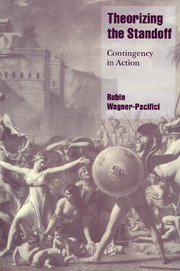2 - The times of standoffs
Published online by Cambridge University Press: 22 September 2009
Summary
What constitutes the objectivity of the temporal indicators conveyed by language is that they are interpreted by means of facts which are not modified by the fluctuations of subjectivity. Whether these facts be of a natural order, such as the succession of days and nights, or of an institutional order, such as the succession of the months, makes little difference. The objective resides not only in what we suffer but also in what we build.
(Gonseth, Time and Method, p. 80)Eternity is in love with the productions of time.
(William Blake, The Marriage of Heaven and Hell)By their very nature, standoffs stop time in its tracks. A certain tension, an expectancy, marks their existence in and through time. Standoffs may reflect entrenched, long-term, serious disagreements of individuals, groups, communities, or nations. Yet the kind of crisis that precipitates itself into a standoff draws attention to itself as a temporal anomaly, something outside of the normal parameters of time. As I noted in the first chapter, standoffs are existentially contingent and thus, at least analytically, temporary – no matter how long they actually last. Everyone knows that the standoff will end, but nobody knows exactly when or how. Standoffs are expected to be broken and resolved, such that the idea of a permanent standoff is a narrative and political anathema. All involved wait for “something to happen” that will break the paralyzing spell.
- Type
- Chapter
- Information
- Theorizing the StandoffContingency in Action, pp. 60 - 95Publisher: Cambridge University PressPrint publication year: 2000



